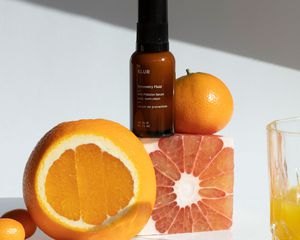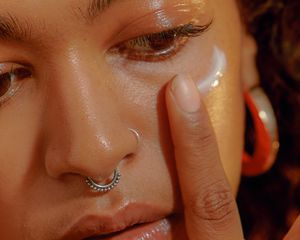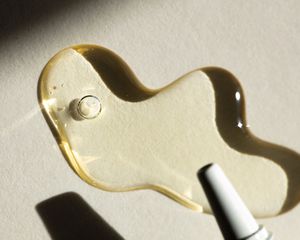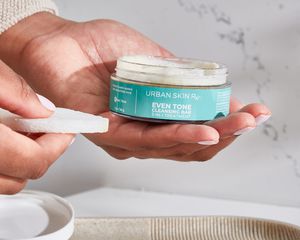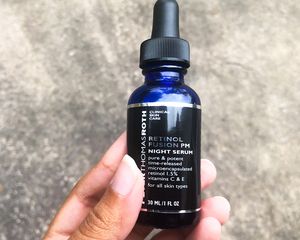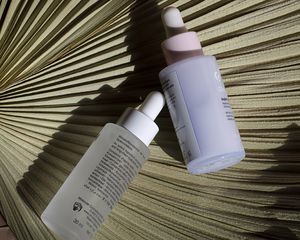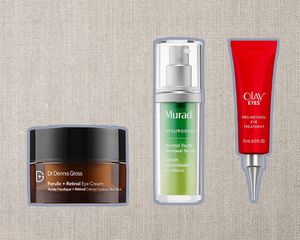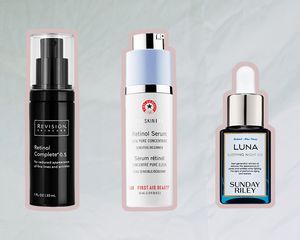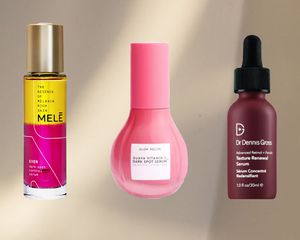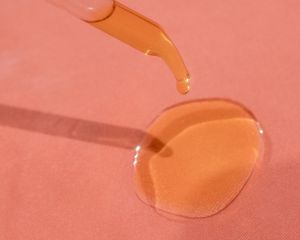
Anna Efetova / Getty Images
Vitamin C and retinol are both popular products on the skincare scene, especially when it comes to reducing dark spots and fine lines. You've probably seen plenty of videos on TikTok or Instagram touting the benefits of each. But positive effects aside, many people are still left with an important question: Can you use retinol and vitamin C together?
We checked in with leading dermatologists Azadeh Shirazi, MD, and Todd Minars, MD. With their expertise, we dive into everything there is to know about combining retinol and vitamin C.
Meet the Expert
- Todd Minars, MD, is a board-certified dermatologist and assistant clinical professor of dermatology at the University of Miami School of Medicine.
- Azadeh Shirazi, MD, is a board-certified dermatologist and host of the podcast "More Than a Pretty Face."
What Is Retinol?
Retinol is a derivative of vitamin A that's often used as a skincare product to renew skin cells, protect collagen by fighting off free radicals, and plump up the skin's deeper layers to reduce wrinkles, fine lines, and visible pores. "[Retinol plays] a role in talking to cells and encouraging healthier more youthful cells to go through the skin layer, hence renewing our skin," Shirazi says. "Many people think retinol thins the skin, but it actually thickens the dermis, the deeper skin layer. Not only does it improve lines and wrinkles, it also improves hyperpigmentation, treats acne, softens rough patches, enhances circulation, and improves overall skin texture and tone."
Retinol is often confused with retinoids, so you might find it helpful to understand that retinol is actually a type retinoid. You might come across retinoids in two different forms:
- Retinoic acid, which is available with a prescription.
- Retinol, which is available over-the-counter.
Retinoic acid is considered the "gold standard" by many dermatologists, Minars says, though he adds that retinols are still effective for most patients.
"A patient should expect results in three months with retinoic acid and in six months with retinol over-the-counter (OTC) products," Minars says. "If a patient comes to me and says, 'I want to correct my photo-aging with only one topical product,' I will always recommend retinoids first, as they're just that effective and consistent."
What Is Vitamin C?
Vitamin C is a powerful antioxidant that protects and defends our skin by neutralizing free radicals, Shirazi says. "It’s like pac-man—it goes around and scavenges these highly reactive molecules that harm and stress the skin."
The antioxidant properties of vitamin C also help with the skin's natural regenerative process, she says. Vitamin C can benefit the skin in a bunch of ways, like improving tone and texture, lightening dark spots, promoting collagen production, and brightening dull skin.
"Vitamin C has some overlapping effects with retinoids—more specifically retinol—but they're not as well-studied, predictable, or effective," Minar tells Byrdie. He generally recommends retinoids to patients looking for a product that helps with rejuvenating the skin. But in cases where retinol irritates the skin, he recommends vitamin C serum as an alternative, with the caveat that vitamin C serums aren't typically as effective as retinoids.
Can You Use Retinol and Vitamin C Together?
There's no problem with using both retinol and vitamin C as part of your skincare routine, dermatologists say. In fact, Shirazi calls this combo a "power couple" when it comes to aging well. But you will want to be mindful about when you use your vitamin C and retinol. To avoid the potential risk of irritation, Shirazi doesn't recommend layering your products together. Instead, she suggests using vitamin C in the morning and retinol at night.
Minars' advice is a bit different. He says it's okay to use both products at night, but with a plan in place to deal with the irritation that's like to occur. "My recommendation is to start one at a time and then introduce the other every other night until you get used to it or can comfortably say it's not irritating when combined," he says.
The Benefits of Combining Retinol and Vitamin C
Using retinol and vitamin C together (this doesn't have to be at the same time) may result in smoother, brighter skin. "Vitamin C defends, protects and supports collagen production, while retinol renews skin cells and stimulates collagen," Shirazi says. "They both reduce pigmentation and brighten discoloration."
Though the benefits of combining vitamin C and retinol can be marginal, simply because retinol is so effective on it's own, Minars tells us. "If your skin does not get irritated by combining them, and you perceive added value from the pairing, then go for it," he says.
The Side Effects of Combining Retinol and Vitamin C
If you decide to use both vitamin C and retinol as part of your skincare routine, irritation is the most common side effect you might encounter, especially if you layer the products. But you can avoid this irritation by spacing out the application of each product, using retinol at night and vitamin C in the morning.
Another downside to using retinol and vitamin C is cost. Compared to products like moisturizer, retinol and vitamin C can both be a bit more pricy. "That being said, depending on your past photodamage and your goals for rejuvenation (whether aesthetics, self-esteem or confidence boosts, etc.) many patients find the expenses worthwhile," Minars says.
Both dermatologists we spoke with pointed out that vitamin C products can vary a great deal in terms of quality, so it's probably best not to buy any random product you come across while scrolling through instagram. "That’s the one product I would splurge on because it’s hard to formulate a stable vitamin C so that it can work it’s magic in the skin," Shirazi says. "Higher percentage vitamin C can also cause breakouts on acne prone skin, so I suggest using a lower percentage like 5-10% if you have acne or sensitive skin."
Minars recommends sticking with sophisticated, tested, and review brands and formulations for both retinol and vitamin C, but he says the variability between different vitamin C products is likely greater than between various retinol products.
The Final Takeaway
You can definitely use retinol and vitamin C in your skincare routine, but it's probably best not to use them at the same time if you want to avoid irritating your skin. Consider applying retinol in the evenings and vitamin C in the mornings. Both of these products can help rejuvenate your skin in many ways, such as improving your skin texture and tone, reducing fine lines, lightening dark spots and brightening dull skin.



